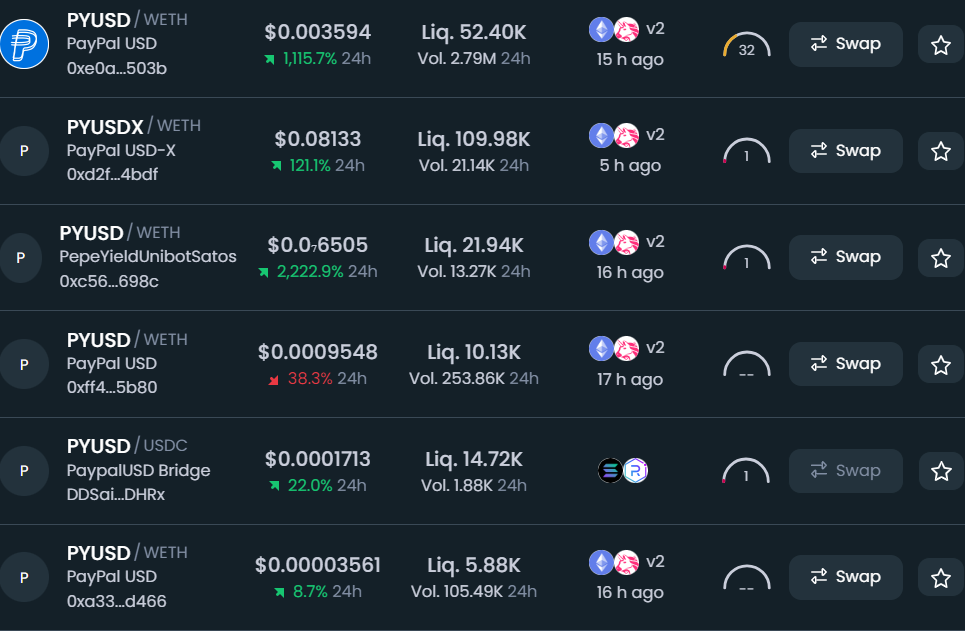
Introduction:
The recent launch of PayPal's dollar-pegged stablecoin, PayPal USD (PYUSD), has caught the attention of scammers looking to defraud unsuspecting users. These scammers are taking advantage of the excitement around the launch and issuing fake PYUSD tokens on various blockchain networks, such as Ethereum, BNB Chain, and Base. In this blog post, we'll delve into the details of this scam, how it works, and the precautions users should take.
The Rise of Fake Tokens:
As PayPal announced the introduction of its PYUSD stablecoin, scammers saw an opportunity to exploit users' enthusiasm. Over 66 fake tokens claiming to be PYUSD have surfaced on different networks, particularly on Ethereum, where the original PYUSD is based.
Scammer Tactics:
The modus operandi of these scammers involves issuing tokens named "PYUSD," providing liquidity using Ethereum or other tokens, and offering them to users on decentralized exchanges. The process of creating these fake tokens is relatively simple, as anyone can call a smart contract and generate tokens for a minimal cost. Decentralized exchanges facilitate immediate token issuance, liquidity provision, and trading.
Illusion of Trendy Tokens:
To attract unsuspecting users, scammers purchase a significant portion of the fake token supply after issuance. This strategy creates the illusion of a popular and trendy token. The scammers' goal is to entice investors looking for quick gains, making it a potentially lucrative but highly unethical endeavor.
Rug Pull Risk:
While some scammers may choose to maintain the appearance of a legitimate token, others might execute a "rug pull." This involves withdrawing all liquidity from the fake tokens shortly after issuance. As a result, token prices plummet by 100%, leaving investors with worthless assets.
PayPal's PYUSD: A Legitimate Offering:
It's crucial to note that PayPal's PYUSD stablecoin is a legitimate offering by a major financial company. The authentic PYUSD allows users to transfer funds between PayPal and supported external digital wallets, pay for goods and services, and convert supported cryptocurrencies to and from PYUSD. However, users need to exercise caution and verify the authenticity of the tokens they encounter.
Protecting Yourself:
To avoid falling victim to these scams, users should follow these precautions:
1. Research: Before investing in any token, conduct thorough research. Verify the legitimacy of the token's issuer and its connections to reputable platforms.
2. Double-Check: When encountering PYUSD tokens, double-check their source and legitimacy. Look for official announcements from PayPal or trusted sources.
3. Use Reputable Exchanges: Stick to well-known and reputable decentralized exchanges when trading tokens. Exercise caution with newly established platforms.
4. Skepticism: Be skeptical of tokens with promises of astronomical returns in a short time. If something sounds too good to be true, it probably is.
Conclusion:
As scammers try to exploit the excitement around PayPal's PYUSD stablecoin launch, users must remain vigilant. The emergence of fake PYUSD tokens highlights the importance of due diligence and caution when investing in the cryptocurrency space. By staying informed and adopting best practices, users can protect themselves from falling prey to fraudulent schemes.
1 comments
Norbert Nyakundi
Many have lost their money because they don't learn how this companies operate,I being one of then have lost a lot of Dollars in these schemes until i came a cross Diena which has given me some peace of information where i can put my money and see it growing day by day,therefore i urge each and everyone reading this to change their ways of investing in online businesses which promises high returns whereby you yourself you don't have information as from where that money comes.